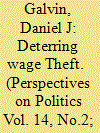| Srl | Item |
| 1 |
ID:
190411


|
|
|
|
|
| Summary/Abstract |
What are the various ways in which local governments in China accommodate migrants through housing policies, and what are the forces that drive these variations? Through systematic coding of policy documents from 97 prefecture-level cities, this study captures the patterns of migrant housing policies using cluster analysis. We found that 18.6 per cent of the cities adopted a residual approach. Most cities adopted a rental-based approach (public and private rental, and collective rental) that could only meet migrants’ short-term housing needs. Only a few cities (12.4 per cent) adopted a citizenship-oriented approach, which best fits the central government's overarching goal of facilitating migrant workers’ long-term settlement in the host cities. Regression analyses examining the determinants of local migrant housing policies showed that the policy variations were not only shaped by economic and political concerns but also the salience of urban issues (problem-solving functions) and previous welfare generosity (path-dependency tendencies).
|
|
|
|
|
|
|
|
|
|
|
|
|
|
|
|
| 2 |
ID:
146102


|
|
|
|
|
| Summary/Abstract |
Can stronger state-level public policies help protect workers from “wage theft?” In recent years, workers' rights groups have responded to policy drift and legislative inaction at the national level by launching campaigns to enact stronger penalties for wage and hour violations at the state level. Many of these campaigns have been legislatively successful and formative for the development of “alt-labor.” But are such policies actually effective in deterring wage theft? Previous scholarship has long concluded that although stronger penalties should theoretically make a difference, in practice, they do not. But by confining the analysis to the admittedly weak national-level regulatory regime, the existing literature has eliminated all variation from the costs side of the equation and overlooked the rich variety of employment laws that exist at the state level. Using an original dataset of state laws, new estimates of minimum wage violations, and difference-in-differences analyses of a dozen recently enacted “wage-theft laws,” I find that stronger penalties can, in fact, serve as an effective deterrent against wage theft, but the structure of the policy matters a great deal, as does its enforcement. The implications for workers' rights and the changing shape of the labor movement are discussed in detail.
|
|
|
|
|
|
|
|
|
|
|
|
|
|
|
|